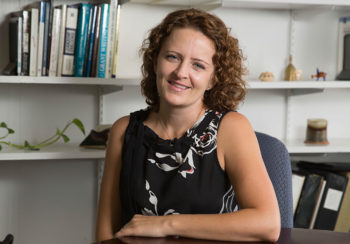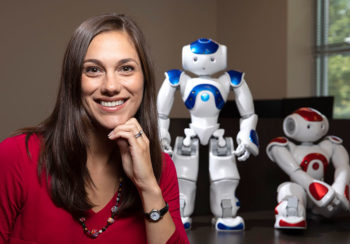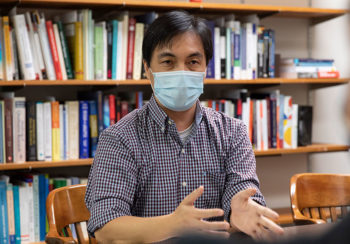The University of Georgia Office of Research, in partnership with the Office of the Provost, has announced the 2023 cohort of its Teaming for Interdisciplinary Research Pre-Seed Program. Twelve teams from across the university were selected.
Ranging from translational veterinary research to the development of an artistic performance and prediction lab, this year’s cohort reflected the breadth of UGA and interdisciplinary nature of its researchers.
“The formative support the pre-seed program provides through this small injection of funds and team science resources enables teams to meet, exchange ideas and strengthen their interactions,” said Larry Hornak, associate vice president for strategic research development. “Over our first three years, we’ve seen exciting growth of deep and sometimes unexpected new collaborations with even broader impact than teams originally envisioned.”
Since its inception in 2020, the program has provided pre-seed funding to 56 unique projects in order to facilitate the formation of faculty teams and inspire collaboration around critical areas of research.
Here are a few examples from the 2023 cohort.
Adaptive Smallholder Agriculture in a Changing Climate
Roughly 80% of people in the world depend on food produced by smallholder agricultural systems, but these enterprises are under increasing pressure from environmental change and policies that fail to support small-scale farming and ranching.
That’s where Sechindra Vallury, from the Odum School of Ecology, along with a team of interdisciplinary scholars focused their research. Their proposal focuses on developing research opportunities to support the resilience, sustainability, and livelihood success of small-scale agriculturalists in the Global South, with an emphasis on the Brazilian Amazon and drylands of India.
“The pre-seed grant has been instrumental in boosting existing collaborations with universities and non-profit organizations nationally and globally,” Vallury said. “While there are several seed grant programs, there are not many programs that specifically prioritize fostering team-building activities, so everyone on the team was thrilled to receive this award.”
The team integrates decades of experience in small-scale agriculture systems across a wide range of disciplines. Team members include Donald Nelson of the Franklin College of Arts and Sciences, Gregory Thaler and Emily Bell, both of the School of Public and International Affairs, John Schmidt from Odum, Giovanni Dazzo of the Mary Frances Early College of Education, Jennifer Thompson of the College of Agricultural and Environmental Sciences, and Daniel Markewitz of the Warnell School of Forestry and Natural Resources.
Dawg-omics: A Translational Approach to Veterinary Medicine
Humans and animals experience similar diseases, but most of the research around animal disease involves experimentally induced illness. Improving understanding of naturally occurring animal disease has the potential to unlock diagnostic and therapeutic strategies that can support both animal and human health. With this idea in mind, Benjamin Brainard of the College of Veterinary Medicine started making a few calls.
“One of the most important aspects of this project is trying to bridge the gap between the clinicians and researchers at the hospital with existing expertise on campus,” Brainard said.
This interest in partnerships is reflected throughout the team. Members include Drs. Jonathan Amster, Ryan Weiss and Shaying Zhao in Franklin College, as well as Drs. Joseph Bartges and Jackie Parr from CVM.
With his team assembled, Brainard identified several research gaps the team could address. Areas of interest include occurrence and clinical appearance of diseases like diabetes, coagulation abnormalities, and cancer in animals. The group will focus on the heritability and development of disease, as well as the potential for developing new diagnostic tests. The goal of the project is to position UGA as a center of excellence for translational research, with specific focus on glycomics and metabolomics.
Development of an Artistic Performance and Prediction Lab
Music and dance have been a part of human culture for over 40,000 years, but only in the last few centuries have quantitative methods been applied to understanding the physics of motion and sound. The development of a technology-infused space for artistic performances is at the heart of this project, led by Dean Donald Leo of the College of Engineering.
The project began when Leo started working with Peter Lane in the Hugh Hodgson School of Music (HHSOM). Leo said they were inspired by UGA’s Dancz Center for New Music and motivated to understand how it “could be used as a sandbox for collaborative scholarship.”
The proposed Artistic Performance and Prediction Lab would allow for real-time data collection, audio-visual capture technology, “smart” instruments and computational platforms for machine learning and data analytics. The pre-seed grant will be used to collaborate on research topics of mutual interest and identify potential scholarship.
Team members include Kyle Johnsen and Jagannath Rao from Engineering; as well as Rebecca Atkins, Emily Koh, Peter Jutras, Peter Lane and Margaret Snyder, all of HHSOM, housed within Franklin.
“Many engineers and engineering students play instruments, compose music and utilize creativity in their personal lives and professional activities. Many music faculty are experts in using technology for creative purposes, too,” Leo said. “This partnership allows us to build on these areas of mutual interest to understand how we can pursue collaborative research and scholarship.”
Satellite Remote Sensing Applications for Global Water Resources
Roughly 71% of the Earth’s surface is covered by water, of which about 97% resides in the planet’s oceans. Oceanic vastness and inaccessibility often complicate the study of water resources, but satellite remote sensing can allow researchers to overcome these hurdles.
That’s exactly what this team, led by Sara Rivero-Calle, plans to do.
Rivero-Calle of UGA’s Skidaway Institute of Oceanography has long been familiar with satellite remote sensing. Since joining Skidaway in 2020, though, she has become well acquainted with how this technology can affect Georgia.
“I have become familiar with problems that affect coastal Georgia, and that includes not only the open ocean but coastal marshes, lakes, rivers and estuaries,” Rivero-Calle said. “We humans are tied to water resources, and I would like to use my knowledge, skills and experience to benefit society and the environment and be part of the solution. To do this, we need to think from an interdisciplinary perspective, and we have this expertise at UGA.”
The team she assembled matches that description. Members include Rosanna Rivero in the College of Environment and Design; Clark Alexander, Clifton Buck, Bill Miller (Marine Sciences) Adam Milewski (Geology) and Deepak Mishra (Geography), all in Franklin College; and Lakshmish Ramaswamy (Computer Science), who works in both Franklin and Engineering.
The pre-seed grant has allowed the work of this group to flourish, and their immediate goal is to work together on a NASA proposal. This proposal hopes to involve the team in leading validation efforts for the Plankton, Aerosol, Cloud Ocean Ecosystem (PACE) satellite mission, one of many proposals the group hopes to make in advancing remote-sensing tools.






